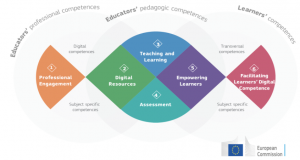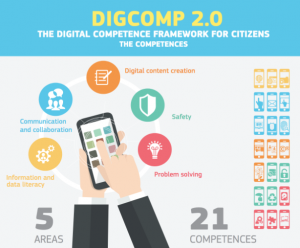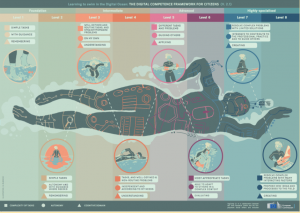Module 1.1: Understanding and raising self-awareness of digital competence among educators and students
Landing the Concept
In order to help educators and students enhance their ability to effectively engage in digital education, an important first step for any strategy is to provide both groups with ways of gaining self-awareness of their digital competence levels and enable them to reflect on their weaknesses and strengths.
A number of general digital competence frameworks have been developed over the last few years with the aim of identifying the knowledge, skills and attitudes that all individuals need for life and active participation in societies where digital technologies play an increasingly important role. An example of this is the DigComp Framework (Vuorikari et al. 2022), created by the European Commission’s Joint Research Centre. DigCompEdu could be used as a base for self-awareness that can be complemented with other educational frameworks, such as: Jisc’s Digital Capabilities Framework (Beetham 2017, Denden 2021, Higueras et al. 2021)
Moreover, frameworks like DigCompEdu (Redecker & Punie 2017) have been specifically devised for educational settings, focusing on the competences that educators and students need in order to successfully engage in digital teaching and learning.

We now invite you to check out the following resources:
1. [Essential] Animation introducing the main characteristics of DigCompEdu:
2. [Essential] The ‘Executive Summary’ (pp. 8-9) and ‘DigCompEdu in a Nutshell’ (pp. 15-17) sections of the European framework for the digital competence of educators http://dx.doi.org/10.2760/178382
3. [Additional] Jisc’s Digital Capabilities Individual Profiles, in particular the following:
-
- Jisc ‘Six elements of digital capabilities’: Learner Profile https://repository.jisc.ac.uk/6619/1/JiscProfile_Learner.pdf
- Jisc ‘Six elements of digital capabilities’: Teacher (HE) Profile
- https://repository.jisc.ac.uk/7283/1/BDCP-HET-Profile-110319.pdf
- Jisc ‘Six elements of digital capabilities’: Leader Profile https://repository.jisc.ac.uk/7351/1/BDCP-DL-Profile-230419.pdf
Take Action!
Now that you are familiar with relevant digital competence frameworks, we invite you to try out some instruments designed to help people in Higher Education gain awareness and reflect on how you might use this in your own context.
1. Use the DigCompEdu Check-In tool making sure you write “StrategyHack” in the ‘participation code’ field right after clicking on the start button.
- EN: English version
- ES: Spanish version
- IT: The Self-Reflection Tool is not available in Italian yet, but you can check the SELFIEforTEACHERS tool instead.
2. Publish a post reviewing the tool/s suggested above and discuss how they might benefit educators and students in your institution. How would you encourage use? What strategic actions would you plan around these tools?
Test Yourself
References
- Beetham, H. (2017). Building digital capabilities: The six elements defined. Jisc. https://repository.jisc.ac.uk/6611/
- Carretero, S., Punie, Y., & Vuorikari, R. (2017). DigComp 2.1: The Digital Competence Framework for Citizens with eight proficiency levels and examples of use. Publications Office of the European Union. doi:10.2760/38842
- Denden, M., Tlili, A., Burgos, D., Jemni, M., Huang, R., Essalmi, F., & Chang, T. W. (2021). Framework for Teacher Support During Remote Teaching in a Crisis: COVID-19, as a Case Study. In D. Burgos et al. (Ed.), Radical Solutions for Education in a Crisis Context, 147-161. Lecture Notes in Educational Technology. Singapore: Springer. DOI: https://doi.org/10.1007/978-981-15-7869-4_10
- Vuorikari, Riina, Stefano Kluzer, and Yves Punie. DigComp 2.2, The Digital Competence Framework for Citizens: With New Examples of Knowledge, Skills and Attitudes. Luxembourg: Publications Office of the European Union, 2022. https://data.europa.eu/doi/10.2760/115376.
- Higueras, M., Tounsi, J., & Burgos, D. (2021). A Flexible Educational Model to Support University in Times of Crisis: The Open Spaces Educational Framework (OSEF). In D. Burgos et al. (Ed.), Radical Solutions for Education in a Crisis Context (pp. 295-305). Lecture Notes in Educational Technology. Singapore: Springer. DOI: https://doi.org/10.1007/978-981-15-7869-4_21


